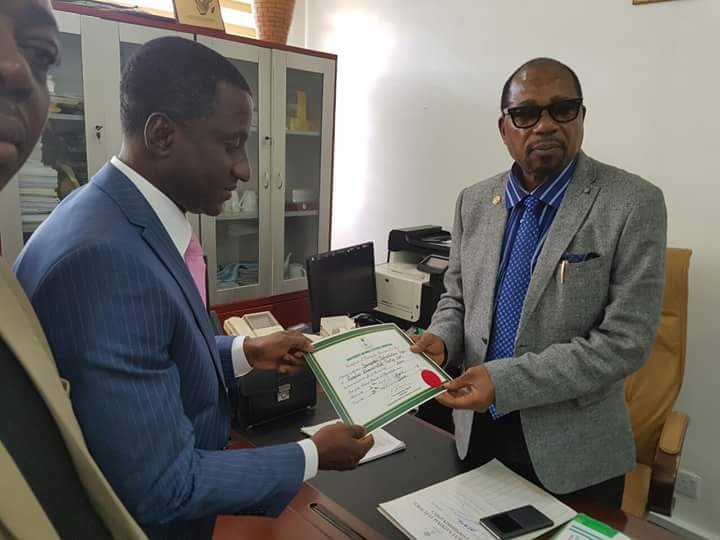BY DAFE OGBAUDU
Technology has been the major driver of economic and social development globally, but most developing nations are yet to nurture the technical capabilities resident in them to develop and maintain technologies they require to make living conducive for their citizenry. This is not far-fetched because the needed training, collaboration, information, resources, incentives and enabling environment that should project them strategically as technologically developed nations have not been given keen attention.
Nigeria, as a developing nation, is endowed with a lot of bright brains who can study a technology, assimilate, modify and adapt the technology to meet her local needs. Unfortunately, over the years, Nigeria has depended so much on foreign technologies as source of new productive knowledge. This practice has rendered a good number of technically inclined and capable minds redundant and irrelevant to the economy of their beloved nation.
Unfortunately, a great percentage of Nigerians have been conditioned to believe they cannot invent a technology that will benefit the nation, and have in turn made Nigerians lose interest in the research outputs from her universities and research institutes across the nation. Several technological inventions are lying fallow and uncultivated at universities and research institutions across the country. This attitude negates the primary aim of establishing these institutions, which is to aid technology transfer from the laboratory to the industry.
Advertisement
It is sad to note that these universities and research institutes have been incapacitated due to several factors currently disorientating the nation, some of which include less focus on professionalized technically-oriented courses that should have been productive in raising time-tested and proven inventors and innovators to the nation’s credit. Little wonder, fresh engineering graduates are not immediately relevant in the industry because their exposure to practical training cannot measure up with the industry’s minimum requirement since practical skills are largely acquired in a working environments. Unlike the medical and legal professions where practitioners are exposed and armed with practical knowledge early, there is a significant dislocation between theory and practice in the technical sector.
Research institutes and universities in Nigeria would have played a key role in technology transfer if there had been an effective collaboration between these institutions and the industry. We must bear in mind that technology transfer is the movement of technology from the point of conception to the place of application (i.e. from the laboratory to the industry). An internally invented technology cannot be successfully transferred to the industry without the support of external funding because the inventor may not have the financial capacity to initiate its transfer. Therefore, there must be a private-public partnership to aid the transfer and commercialization of the discovered technology.
Financing an invention has been one of the greatest challenges to technology transfer in Nigeria since every stage of an invention from the product development to commercialization requires huge financial investment, to this end, many discoveries never saw the light of the day. Against this backdrop, private-public partnership will aid the product development and full-scale commercialization. But what plays out in most cases is that these institutions are left alone to develop and commercialize their innovations on their own, this is practically impossible considering the volume of intellectual output. That is why the collaboration between research institutions and the industry is one of the sure-fire ways to effective technology transfer.
Advertisement
Technology transfer could also be viewed from two stand points, vertical and horizontal technology transfer. The former is a transfer within a nation (internal technology transfer) while the latter is the transfer of technology from one nation to another (external technology transfer). Nigeria spends millions of Naira to acquire, install, adapt and maintain foreign technologies to the neglect of her own. Most times, these deployed technologies are not fully understood by Nigerians so, human capabilities from foreign lands are imported for their repairs and maintenance. This is unlike Asia and Latin America, where technology is bought, it becomes assimilated, adapted, modified, dismantled and re-engineered to produce an innovative version of that technology, fit for its local circumstance and the world. China, is a good example of this model of development.
Unfortunately, our researchers are only researching for research purposes! We have not really valued and taken serious what our researchers have discovered over the years. We believe we can always buy new technologies from developed countries. What a mindset! What a nation! Nigeria has all it takes to be at the fore-front of many of these inventions and innovations globally. Why is Nigeria’s inventions not substantially commercialized? Nigeria is yet to come to terms with the fact that we have all it takes to commercialize our inventions and even export to other nations.
To achieve effective technology transfer as a Nation the key is human resource development. We must invest in a well-trained and equipped technical workforce as that is the key to technology adaptation, operation and management. Secondly, given the high rate of migration of scientists, engineers and technologists from Nigeria to developed nations where their technical competences are fully harnessed and showcased with better take home, insurance and so on. Incentive packages and mentorship programmes attractive to young and upcoming researchers alongside enabling environment would go a long way in helping to keep these researchers in the country.
Thirdly, there must be technology partnership between the institutions and the industry as well as between Nigeria and other developed nations since technology transfer has to do with knowledge sharing and the adaptation of new technology to meet the local condition. This will enhance a viable, effective and robust technology transfer process, and also boost technology capabilities, involvement and strengthening competitiveness. This should be with a view to forming a network to improve access to new ideas, methods and information sharing and material exchange. We should bear in mind that technology partnership can only be effective when both partners meet the required technical competence, otherwise, it will be a lopsided partnership. Additionally, to remain relevant and afloat in the global economy require some level of up-to-date knowledge, innovation, management, and technology capabilities. The astronomical surge in knowledge in the last ten years has made the support needed by technological research and development institutions very expensive that only a few institutions can afford them. Collaboration is the panacea in helping to compensate for the high capital involvement in technologically driven research and development.
Advertisement
We must build confidence in the inventions and innovations of our technical competences and find a way of commercializing them by getting stakeholders involve. These inventions should first be locally commercialized, then upgraded to international standard to compete favourably with other technologies in the world. We must believe in Nigeria-made technology if we really want to achieve technology transfer and cut down on our spending on imported technology as a nation. This must be accompanied by a massive mind re-orientation because we have placed limitations in our minds over the years.
However, this cannot abrogate the words of Napoleon Hills that says: “whatever the mind can conceive and believe, it can achieve”. Great nations of today did not attain greatness by sudden flight but they started out by believing in what they can invent, innovate and mass produce for national consumption, then upgraded to international standard and sold to other parts of the world. Finally, our education system for technically oriented courses should be given a close look and possibly reviewed. It is never too late for us! A journey of a thousand mile must begin with a step. We have the best of brains and necessary resources. All we need do is to articulate and activate all these into an action plan as a nation, and in no distant future, the rest of the world will be importing great technologies from Nigeria.
God bless Nigeria!
Ogbaudu, a technogy analyst, can be reached via [email protected]
Advertisement
Views expressed by contributors are strictly personal and not of TheCable.






